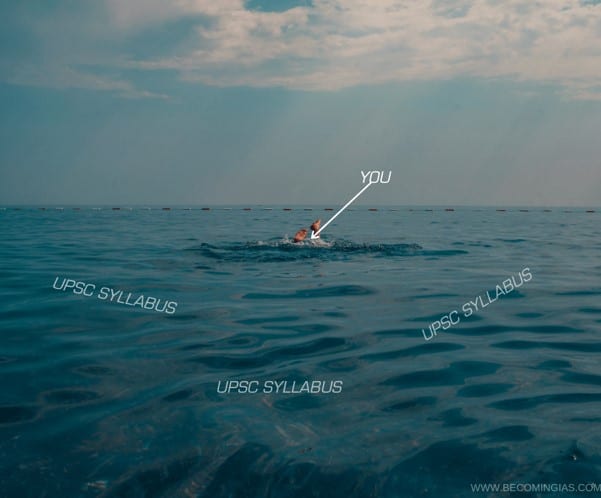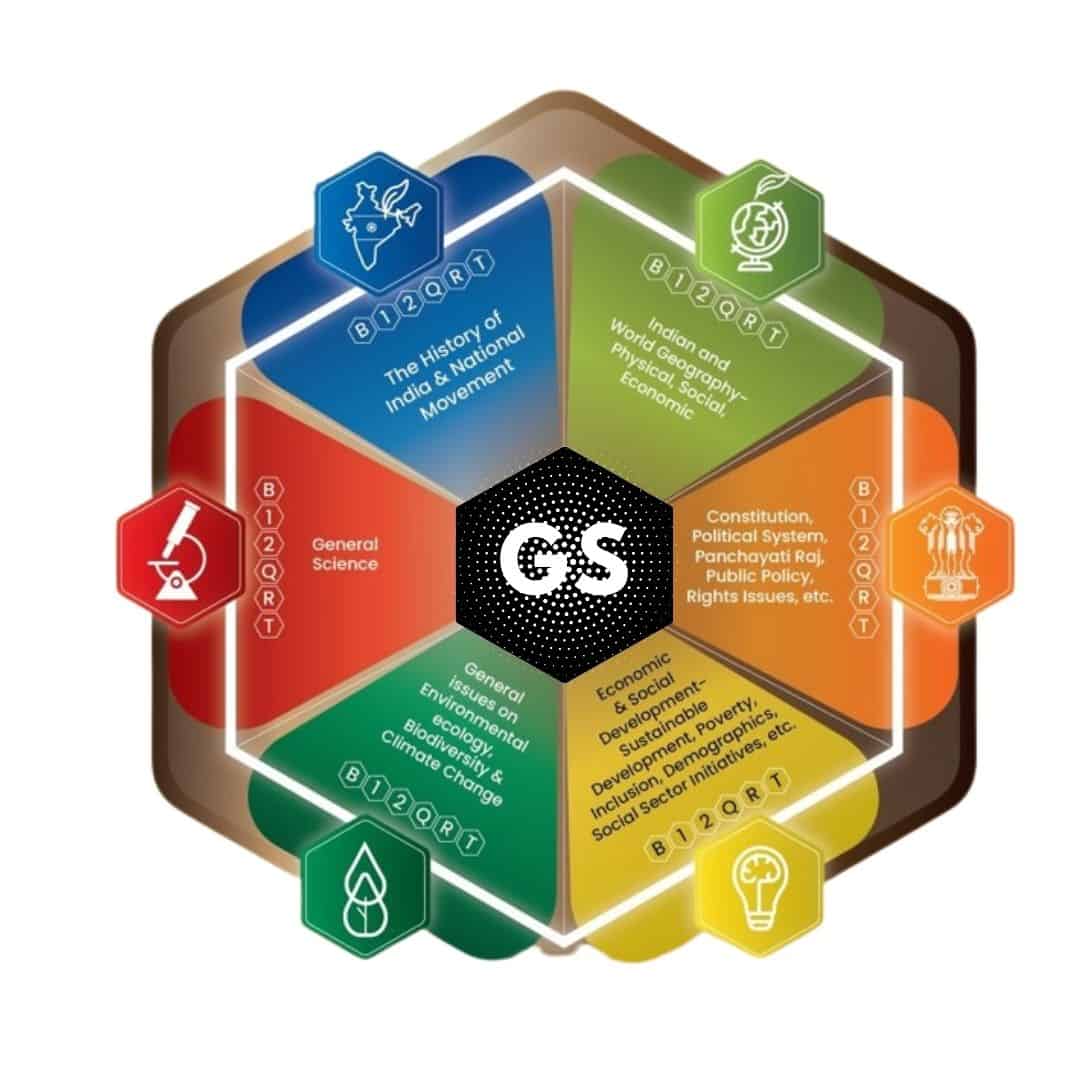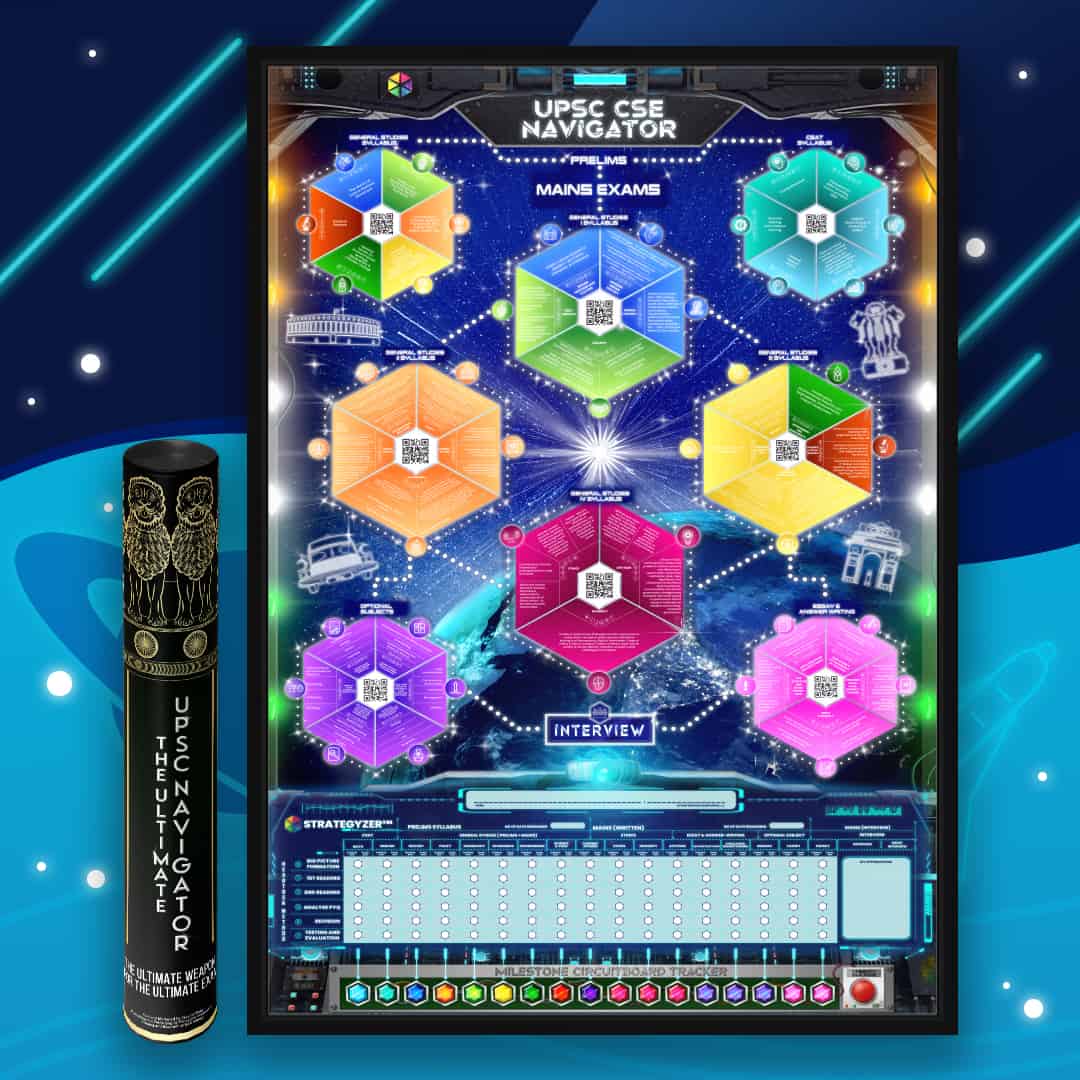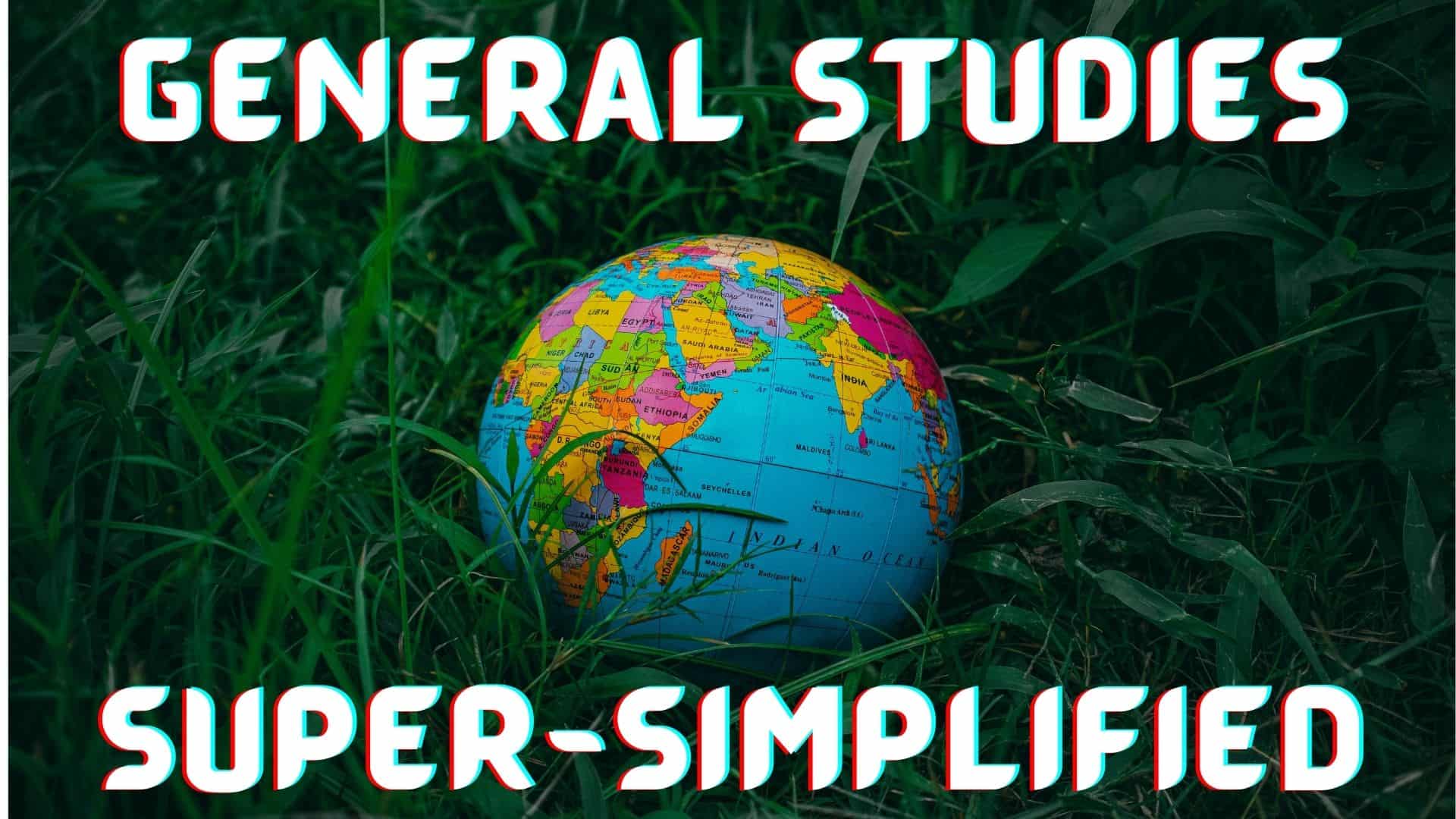
UPSC GS DECONSTRUCTED
The General Studies syllabus seems as vast as the ocean which you get the feeling of drowning in. It includes everything under the sun from planets to presidents, revolts to regulations, economics to earthquakes, and taxes to tsunamis.
But do not let this bother you because no aspirant knows all this from the outset. No one’s prior knowledge is sufficient for this exam and therefore, everyone must learn afresh.
This provides for a level-playing field that you must learn to dominate.
Here are the critical insights you need to know about how to do that-
Critical Insight 1: G.S is Integrated Knowledge Of The World
The ‘General’ in General Studies stands for the fact that knowledge is inter-connected and cross-disciplinary. Specifically for the IAS exam which focuses on the real world where academic divisions are absent.
Your knowledge of General Studies is your knowledge of the world. Your success in the UPSC exam depends on how rich and inter-connected this map of the world is.
Therefore, to simplify General Studies syllabus of UPSC Prelims, prepare the 6 subject-domains (6SD) which you must know deeply about.
- History: History is the dimension of the past which contains everything worth remembering and preserving – the monuments, cultures, kings, battles, revolutions, massacres, or messiahs. This covers predominantly Indian history from ancient to Modern times including the Indian Freedom movement. Falls under Mains G.S paper I.
- Geography: The planet we live is composed of systems- weather, oceans, water, land, the biome are all inter-dependent systems which make life possible on Earth. The study of these systems constitutes Geography which can be further subdivided broadly into human and physical geography. Falls under Mains G.S paper I.
- Polity: The study of how governments are structured, what constitutes its various organs, who gets to make decisions and how leaders are selected. With primary focus on the Indian government structure, governance, and policies. Falls under Mains G.S paper II.
- Economics is the study of allocation and expenditure of resources at the level of the individual (microeconomics) and the level of societies (macro-economic). Falls under Mains G.S paper III.
- Science & Technology: Includes the everyday applications of science, new and emerging technologies but without the technical knowledge. Falls under Mains G.S paper III.
- Environment & Ecology: The study of Earth’s life-supporting systems is Ecology. It includes various vulnerabilities to these systems (such as climate change, ozone depletion) as well as threats to individual species and the efforts to preserve them (like Project Tiger). Falls under Mains G.S paper III.
**Current Affairs: Current Affairs is nothing but the sum total of recent events which represent the ever-changing, practically applicable aspects of the 6 subject-domains (6SD) listed above. For instance, a Tsunami is the dynamic part of geography (Mains G.S paper I) and disaster management Mains GS paper III) while a new government policy falls under the rubric of economics (Mains GS paper III) and Polity (Mains GS paper II). Current Affairs is dynamic GS (See Critical Insight 3.)
This insight has been in-built into the Ultimate UPSC Navigator which uses beautiful color-coding to highlight the overlap of General Studies Syllabus between Prelims and Mains, allowing you to have a highly efficient, integrated approach to G.S for the entire UPSC exam.
Questions on all the above are asked in Prelims and Mains, both. And possibly in the interview as well.
This smart-division into the 6SD or 6 subject-domains of the entire General Studies syllabus allows you to cover UPSC Prelims and Mains syllabus simultaneously – saving precious time. It also allows for much deeper learning.
Which leads directly into the next Critical Insight.

Here is color-coded info graphical representation of UPSC Prelims General Studies syllabus as depicted in the Ultimate UPSC CSE NAVIGATOR
COLOR-CODED HEXA-GEM 1 : G.S PRELIMS IN THE ULTIMATE UPSC NAVIGATOR. Info about the Navigator is here.
Critical Insight 2: G.S For Mains And Prelims Is Equivalent
Until the advanced stages of your preparation, you can safely ignore the distinction between UPSC Prelims and Mains and focus on these 6 subject domains.
While Prelims contains MCQs, the Mains exam contains essay-type analytical answers. For General Studies, the Prelims and Mains are just two different testing formats for these 6 subjects-domains. However, both exam formats require factual as well as conceptual knowledge of the subject matter.
It is easy to lose track of the bigger picture during UPSC preparation which is why the UPSC navigator uses color-coding to represent the 6SD of General studies for Both Prelims and Mains.
The 6SDs are repeated in different levels of details in Prelims and Mains. So that everything green is color-coded as history, everything orange is color-coded as Polity in the Ultimate UPSC Navigator.
This is meant to constantly remind you of the following strategic guidelines-
- General Studies is interconnected and integrated, so prepare accordingly.
- For S, Prelims and Mains are just two different testing formats for the same subjects.
- A subject is cover in more detail in the Mains which constitutes its actual syllabus for the UPSC exam.
- When you study for Prelims, you can always locate the expanded and real syllabus of any of the 6SDs in the Navigator by visually tracking the colour. And vice versa.
- The amount of area on the UPSC Navigator which covers the Hexa-gems of the 6SD represents the proportion of importance of General Studies in the entire UPSC syllabus. Area covered by 6SD Hexa-gems = 60-70%= Weightage of General Studies for the entire IAS exam.
The Ultimate UPSC Navigator uses color-coding for the 6SD to help you instantly visualize the extent and syllabus distribution for each subject domain, along with its place in the UPSC exam format.
But the color-coding of the 6SD goes far beyond this. It forms the basis of your Ultimate preparation strategy for UPSC General Studies

The Navigator contains everything an aspirant needs for UPSC preparation in 1 FINAL place- the entire syllabus, strategy, resources, roadmap, tests, playlists and more. (I wish I had it when I was preparing). Details about the Navigator are here.
Critical Insight 3: Current Affairs Is Dynamic GS
It would be an understatement to say that Current Affairs should be connected to GS. The truth is in fact that Current Affairs IS General Studies. The core of your syllabus in the UPSC exam is General Studies meaning that everything exam-related emanates from GS and is connected to GS in one way or another.
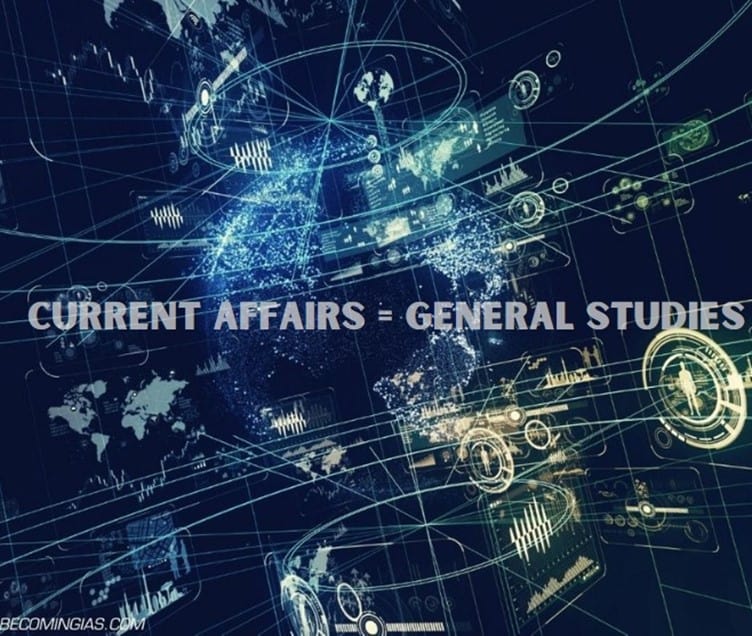
Current Affairs is dynamic GS.
Current Affairs is nothing but the sum total of recent events which represent the ever-changing, practically applicable aspects of the 6 subjects listed above. For instance, a Tsunami is the dynamic part of geography (Mains G.S paper I) and disaster management Mains GS paper III) while a new government policy falls under the rubric of economics (Mains GS paper III) and Polity (Mains GS paper II). Current Affairs is dynamic GS (See Critical Insight 3.)
Another example of CA = GS is the Nobel prizes which are advances in fundamental disciplines. The UPSC expects you to be aware not only of the recipient of the prize and their achievements but the underlying concepts and fundamental basis of their work. Your knowledge must be inter-disciplinary and integrated.
Current Affairs is not a separate subject deserving isolation. It is connected to everything else. Your job as an aspirant is to understand these connections.
This is why Current Affairs is placed after all the 6SD in the Strategyzer of the Ultimate UPSC Navigator.

Read about how to prepare Current Affairs for UPSC

Current Affairs Hexa-gem in Strategyzer of Ultimate UPSC Navigator
Critical Insight 4: GS Syllabus Is A List of Goals For GOI
The UPSC exam first and foremost, is about India and your suitability to serve in the country’s government machinery.
Topics included in the UPSC syllabus are not arbitrary. The UPSC is looking to recruit people who have knowledge of areas relevant to the career of an Indian civil servant. The topics included in the General Studies syllabus are meant directly to test that knowledge.
Here is an excerpt from the official UPSC notification-
- Ethics General Studies paper IV in the Mains exam is a case in point. It is no surprise because many countries of the world include a test of ethics in the recruitment of their Civil services and now, so does India.
- Polity is included and emphasized in the UPSC exam because it is the essential information about the organization you wish to work for.
- Likewise, history is included to ensure that officers possess knowledge and appreciation for the cultural diversity of our country. The same can be said for all the 6SDs of the UPSC General Studies syllabus.
The General Studies syllabus includes topics that are the goals of the Indian government (regardless of the Political Party in power). These are formally enshrined in the Constitution of India, most explicitly in the Directive Principles of State Policy.
**Notice how closely almost each one of the Directive Principles of state policy corresponds to a different ministry of the Government. These goals are, in a way, the syllabus FOR any Indian Government- your future employer.
The symbolism used in The Ultimate UPSC Navigator is meant to reinforce this insight into your preparation.
And that is why these goals are in the UPSC syllabus too. Questions in the exam are to test your understanding of the goals and the complex challenges which stand in the way of their accomplishments.
If you approach General Studies with these in mind, then the ocean will become your playground, and you will surf on it instead of sink in it.

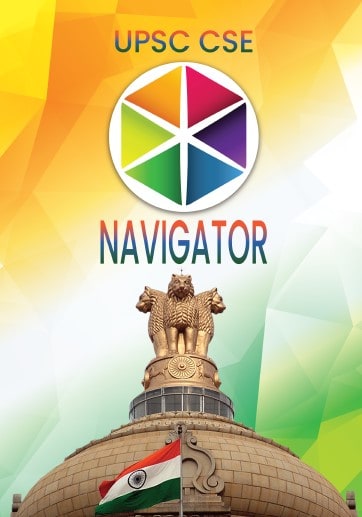
Critical Insight 5: Curiosity Is The Secret Weapon
The UPSC is explicitly and directly tells you how to approach this examination in the official notification.
The emphasis of the UPSC on curiosity and Interest is evident. The word ‘Interest’ is mentioned THRICE in a single paragraph in the UPSC notification! This is because curiosity breeds awareness and the UPSC is looking to recruit people who are acutely aware of their surroundings.
The good news is that you can develop a genuine interest in virtually anything.
Curiosity can be learned and sustained. Not only will it help immensely in the UPSC exam but will also make your life extremely interesting!
Genuine curiosity about a topic is the secret sauce responsible of truly deep understanding versus a superficial one. The mind attends to what excites it. If the topic excites you, your brain will absorb everything like a sponge.
Here’s how to use the Feynman technique for IAS preparation to get curious about anything.
Booklist for General Studies
This booklist should form the core of your textual source code for UPSC GS. But remember that these books should enter the picture AFTER the Big Picture Formation of a topic is complete. It is the only way to obtain a deep understanding of the topic. The Big Picture Formation in the Hexatask method is meant to prepare a conceptual structure in your mind over which, you can inlay more details from the textbooks listed below. And it is the only way to consume the following textbooks in a structured and efficient way.
History:
Ancient and Medieval India:
- TN Board Class 11 book/ Old NCERT Class 11th
Modern India:
- Class 12th old NCERT
- A Brief History of Modern India by Rajiv Ahir (Popularly known as ‘The Spectrum’)
Art and Culture:
- NCERT Class 11th: An introduction to fine arts
- CCRT Website
Economics:
- Class 11th and 12th NCERT (for beginners)
- Sriram Economics
- Current Affairs
Geography:
- Class 11th NCERT: Fundamentals of Physical Geography
- C Leong
- Class 11th NCERT: India Physical Environment
- Class 12th NCERT: Fundamentals of Human Geography
- Class 12th NCERT: India- People and Economy
- Oxford/ Orient Black swan Atlas for Mapping
Polity:
- Laxmikanth
- NCERT Class 11th (if required)
Environment & Ecology:
- Class 12th Biology (Environment-related chapters)
- Shankar IAS Environment/ PMF IAS Environment
- Current Affairs
Science & Tech:
- Basic NCERTs depending upon the knowledge base
- Current Affairs
You will find the remaining source code for the 6 Subject-Domains 6SD above for Big Picture Formation
INSIGHTFUL ARTICLES BY TOPPERS
- https://becomingias.com/gs-score-booster-cheat-sheet/
- https://becomingias.com/the-absolute-best-way-to-prepare-current-affairs-for-the-ias-exam/
- https://becomingias.com/how-to-use-ncert-for-upsc/
Disclaimer
While we strive to provide you with updated information, please go through the latest official exam notification to check the detailed eligibility criteria for the specific exam year to avoid any confusion.
